#just one month left...
Explore tagged Tumblr posts
Text
Cant lie i love uni i cannot be arsed about football rn <3
#got the biggest pimple on my lip but who gaf im sooo priviledged i get to study and i get to do it in a expensive city + dont have to work#sham!s rambles#have to lock in a bit in the weekend BUT marvel rivals is so fun and ill watch some movies and aaargh <3#just one month left...
8 notes
·
View notes
Text


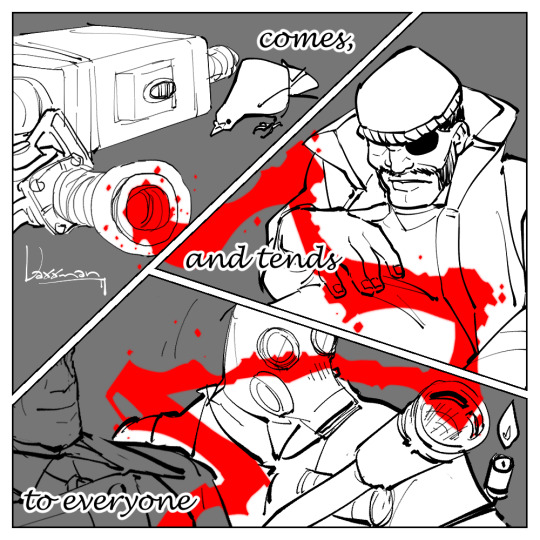

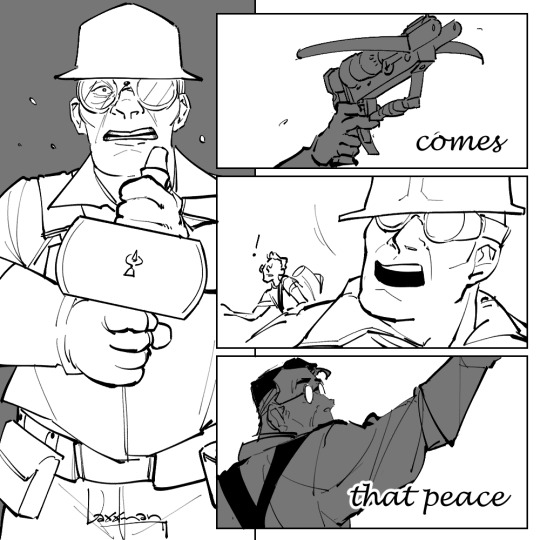
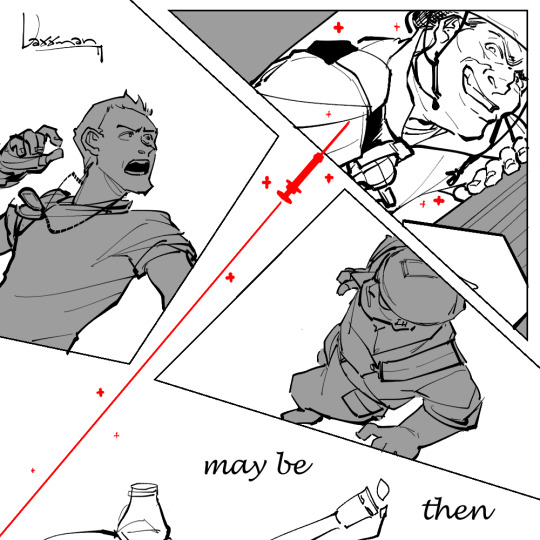


You'll be at peace.
Archimedes is watching these two pop off and clean the capture point.
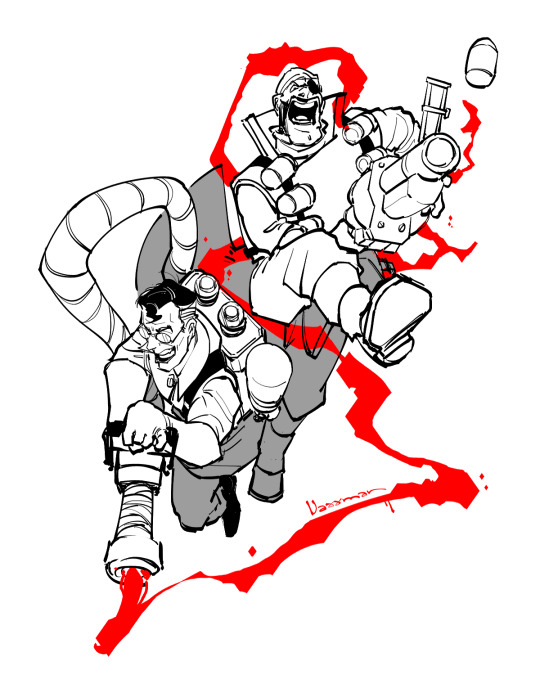
And here is the second panel without text.
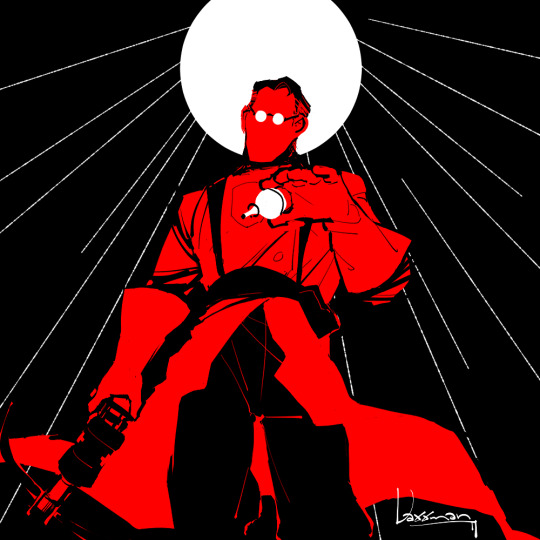
The text is based on a Moravian (geographically that's in the Czech Republic now) Christmas song that was adapted into German in 1973. It has a very lovely tune.
The translation is based on the German lyrics because they are more vague than the original Moravian lyrics and therefore more fit as narration text. I made them singable in English, you are welcome.
Happy holidays.
#team fortress 2#tf2#tf2 medic#I don't celebrate btw I just wanted to have god complex medic posted on christmas#Theodor if you read this; I'm sorry to have teasered this 7 months ago and just left you in the dark about what it was#this was based on an experience on viaduct where sollies love perching on top and no one looks up
2K notes
·
View notes
Text











That time of the decade where I throw a bunch of old drawings together and post em. Here's an LU doodle dump/character study/ animation test. Some of these are actually quite old, others pretty recent. Anyways! Enjoy the look into my mind (Not much in there TBH)
#linked universe#thetoyboxs#my art#linkeduniverse#lu chain#a lot of these are wips I most likely will finish#just not anytime soon sadly#still!#hope these are entertaining enough...#for now!#I actually had a lot more than these#but these were like#the ones that actually was postable#yikes#can you believe we've only got a month left of 2024?#I can hardly#what a year#(I hardly remember it)
1K notes
·
View notes
Text
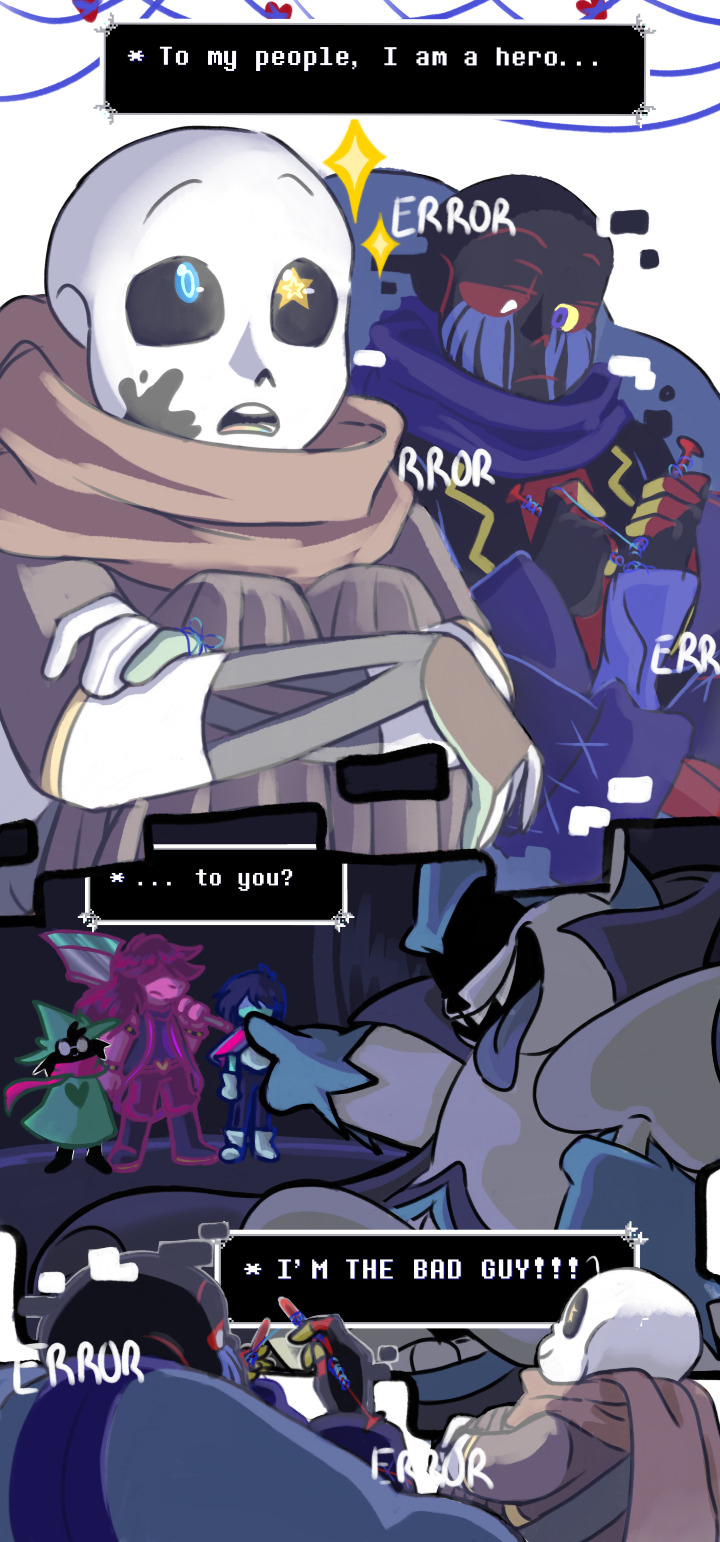
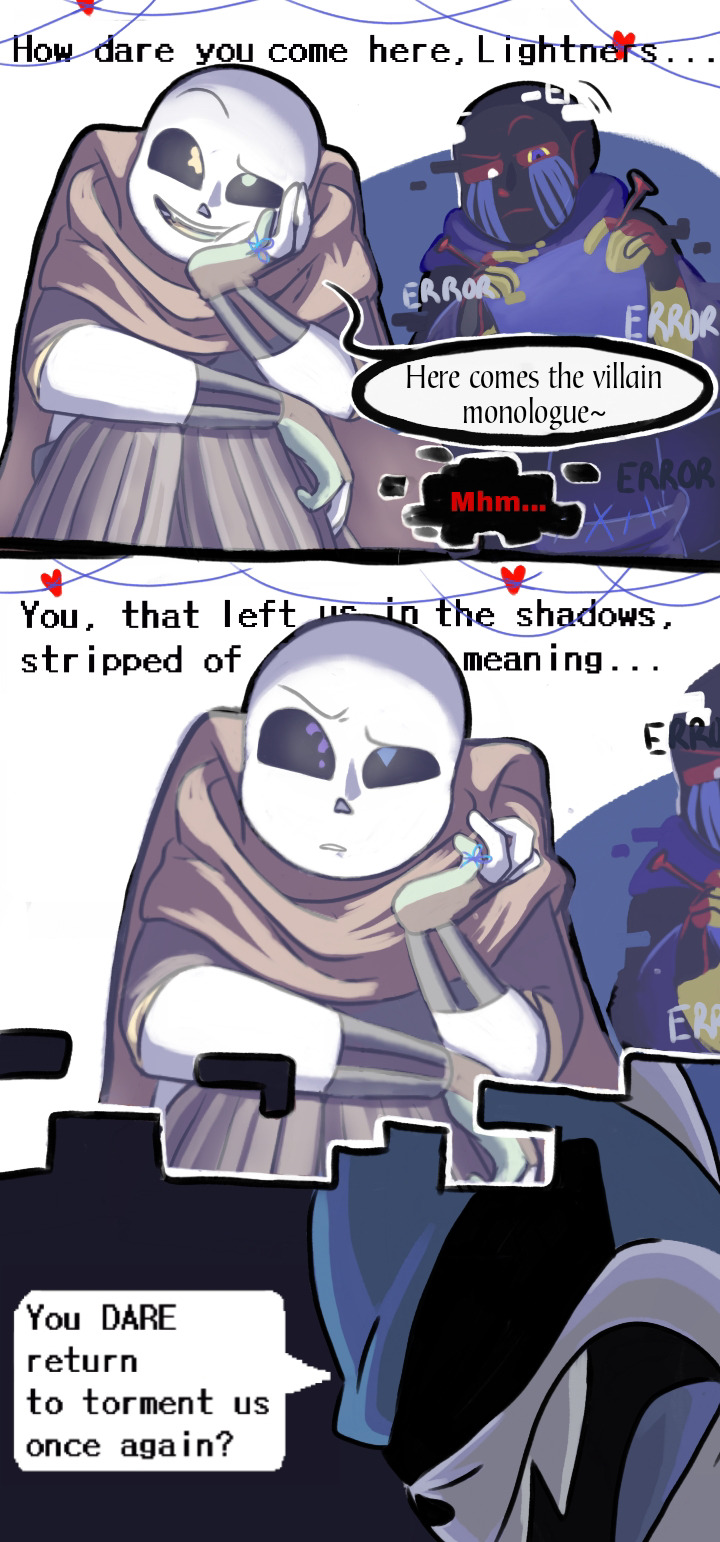

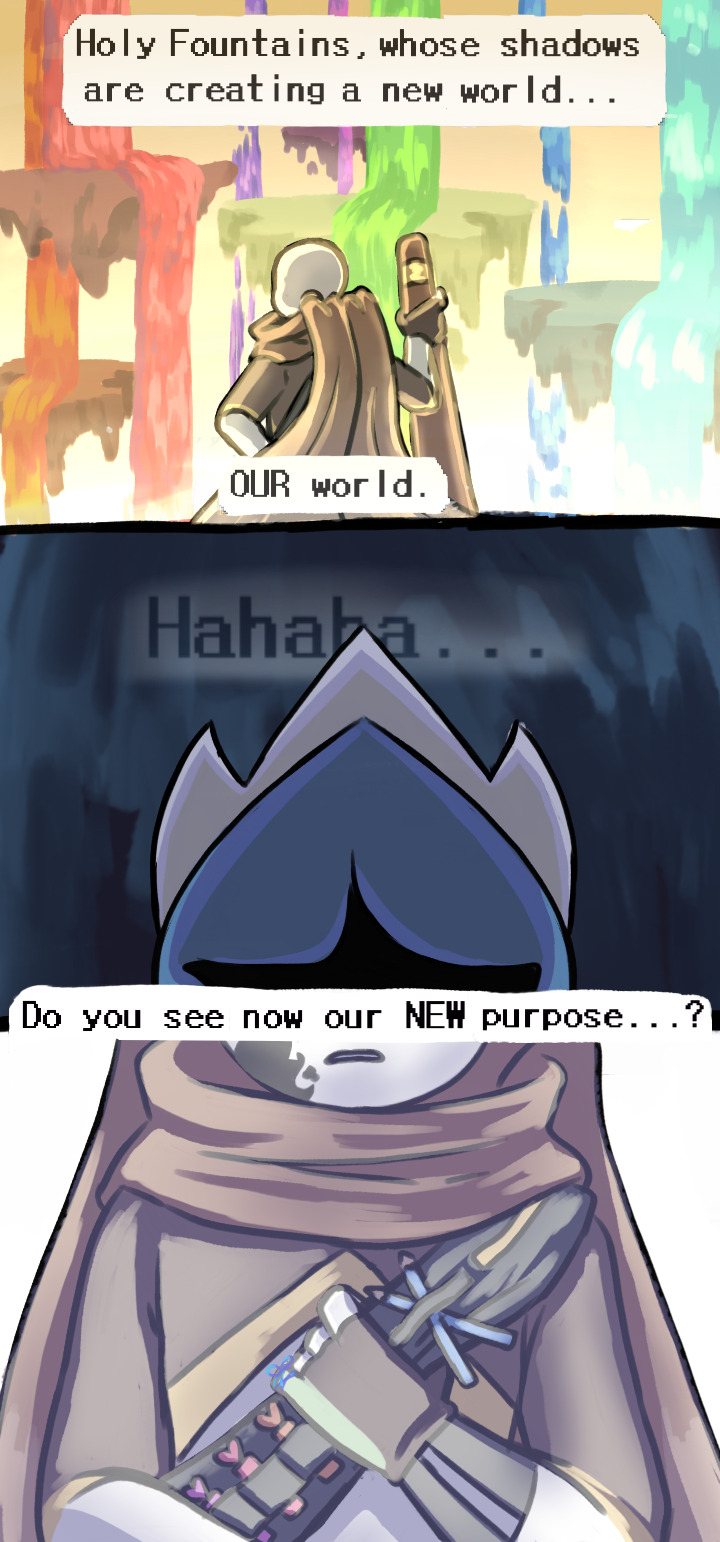
[Abandoned by the Lightners, his heart became cracked with hatred.]
Hitting a lil' too close to home?
#junie art post#ink sans#error sans#utmv#errorink#implied. but yea not the focus#this has been turning around in my mind for quite some time. im glad to finish it lmao idk if my ramblings make sense even.#so like listen. do you ever think about how similar the function of the utmv is to the dark worlds in deltarune.#in a meta narrative to fandom sense? idk the word#we are making exaggerated expanded worlds of the ordinary tools and entertainment of the real world and make it into something more#isnt that very very interesting?#and we explore every sort of possibility in that creation. both good and bad#and when all is said and done. every possibility found and the entertainment and secrets has all run out#we put it away. abandon and leave it behind#what is left? what happens to the world and characters we have created? can it sustain without us?#what of the ones left in the dark?#idk if yall saw me a few months ago but i reblogged comyet's old post of ink begging us not to leave him alone and to keep creating#yea that never left me#and seeing exactly THAT SCENARIO in deltarune made my brain iTCH#imagine an ink in King's position.... wait isnt that just underverse#mmmmmmm. darkner ink.....#also error is here too. not just for errorink or that i can't separate these two to save my life#but error is also one of the few people to be able to GET IT?? he can hear the creators too. ink cant#but hes pretty much programmed himself to avoid having a mental break down to this via reboot memory loss.#and ink has his own internal coping mechanism (hooray for short term memory loss)#these two idiots will do anything but confront truths lmfao#ahhh my favorite idiots. never change#mmmmm#deltarune
3K notes
·
View notes
Text
Um.. Superman.. what that thing stuck on your cape?
Clark's brain short circuit for a moment as he just got back of flying at great speed in the middle of deep space to thrown one of Lex's giants bombs destroy the city and come back in record time.
He turn a bit to look at his cape to see a tiny humanoid starlight dust covered child with white hair, glowing full green that look like white specks stars were implanted themselves into his big ol eyes, nawing on a handful of stardust with inhumanly sharp itsy bitsy fangs.
A small yet floating crown that look similar to one of Nasa pictures of far out space.
Did he just accidentally abducted an royal alien child/teen?
#dc x dp#dpxdc#danny phantom#dp x dc#dp x dc crossover#dc x dp prompt#dcxdp#danny is the ghost king#Danny's core is space#he eats stardust like a cat on catnip#all j'onn could hear in his mind is an beautiful universal documentary of space along with a guy singing space is so cool in the background#Danny's core took the main pilot of his mind and went apesht on stardust throughout the universal#there are some otherwordly aliens spaceshifts that got totally destroyed during Danny's adventures#another having full on cults that talks about this otherwordly being saving their planets from space invaders#the green lanterns are very concerned on how Superman accidentally kidnapped a alien that wanted alive in other part of the universe#one green lantern is looking as if he just saw his most beloved role model and wouldn't stop speaking in his native tongue with excitement#meanwhile in Danny's dimension is just a normal Tuesday since danny just left on his 3 month vacation as ghost king#danny accidentally thought Superman's cape was something kyptonian and his obsession explode with i wanna touch that#got a free ride along with it
3K notes
·
View notes
Text



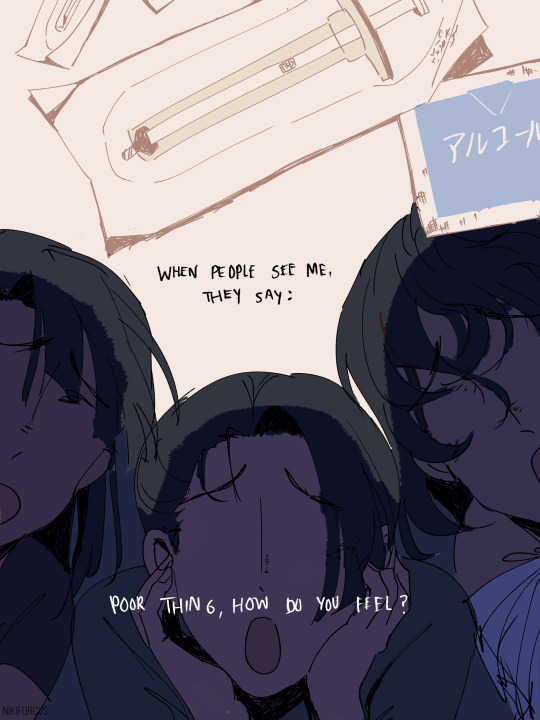

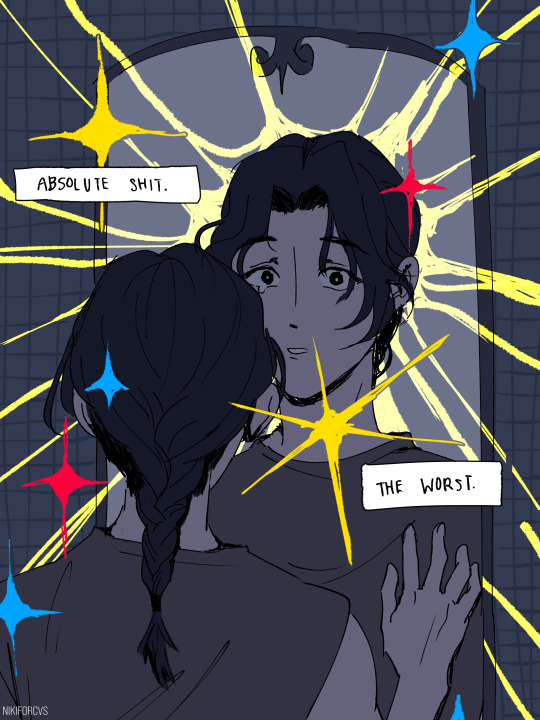

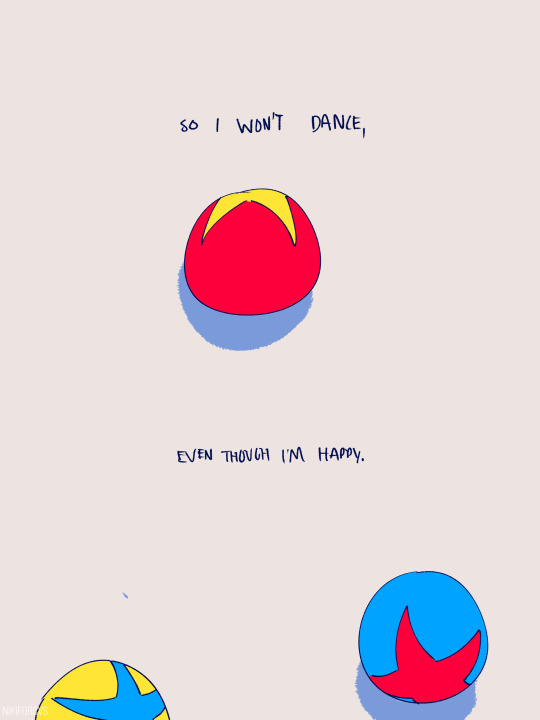

pick your battles
#my art#my stuff#art#comic#original art#pride 2024#pride month#trans allegory..... or not even allegory. just trans .... ^_^#i technically cannot come out yet but i don't think the people who i need to not see this stalk my tumblr#i know they stalk everything else like my twitter and my instagram but this might be safe#so fuck it we yap. this is a comic about picking your battles#this is a comic about how for almost a year now everyone at home in singapore has been crying about my sore throat#my terrible fucked up voice. my you know. etc#i came out as not cis and using they/them pronouns in 2015 when i was 14#but no one ever used my pronouns. none of my classmates or friends even up until i left for college in 2020#from 2020 onwards every year i wrote an angry vulnreable essay about how much it hurts that they dont remember#and people would dm me apologizing on their hands and knees and commending my bravery#and then forget about it all over again. id ont mean 'they misgender me and then catch it and apologize and correct themselves'#i mean they dont even get that far#and so you might ask yourself: why have you kept them around all this time?#and i would have to explain that by pure bad luck i grew up in the most conservative close minded community#that all of my ex classmates that stayed in singapore are cishet and upper middle class and chinese singaporean#that i Am the trans person. that they were able to ignore me for a decade partially because there was no one else#so this is a comic about how there is dignity and grace in staying in the closet sometimes#about how not everyone deserves to see you at your happiest. about how some people can go fuck themselves#you know your truth and THATS THE ONLY THING THAT MATTERS!!! YEAH!!! i love you
1K notes
·
View notes
Text


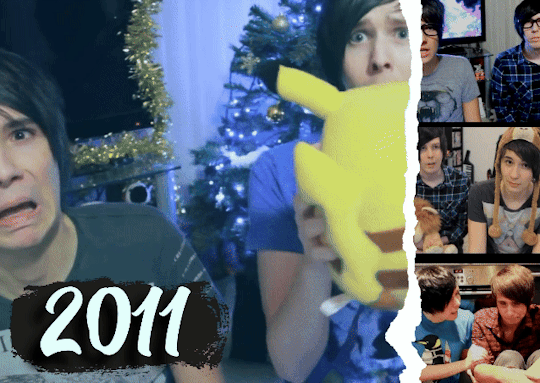
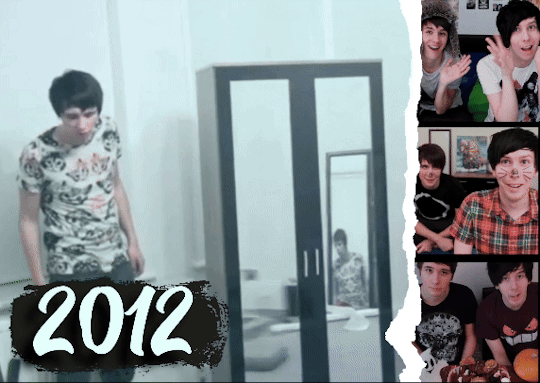
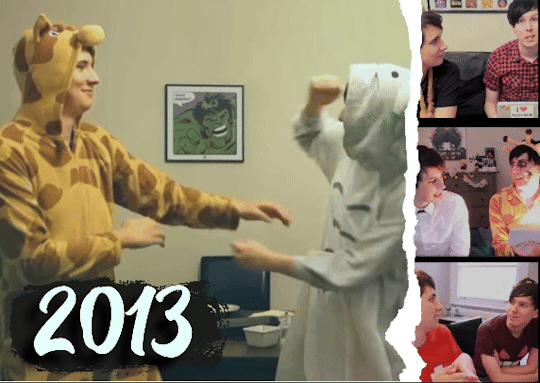

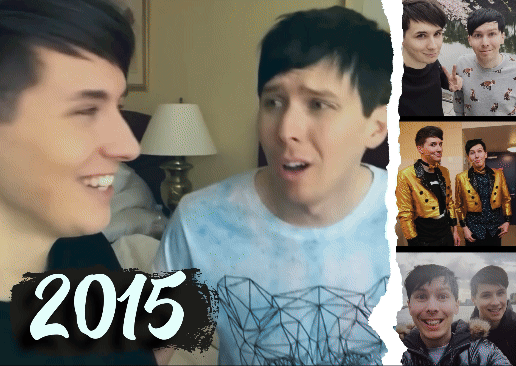
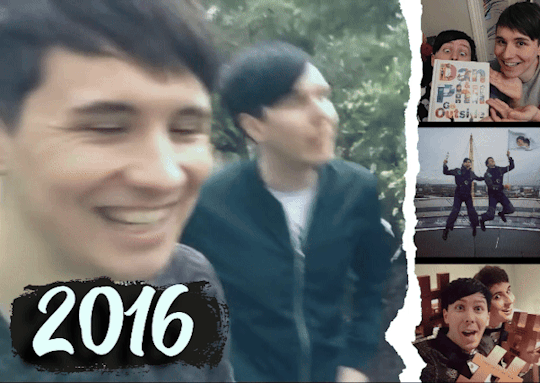
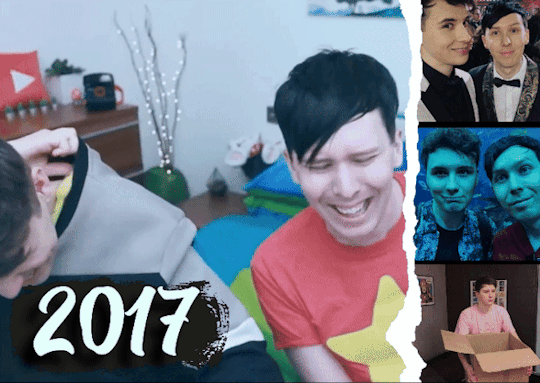
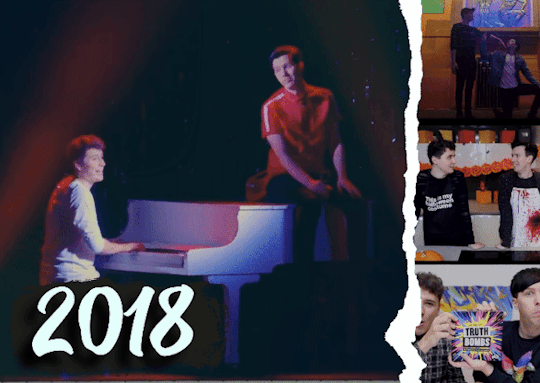




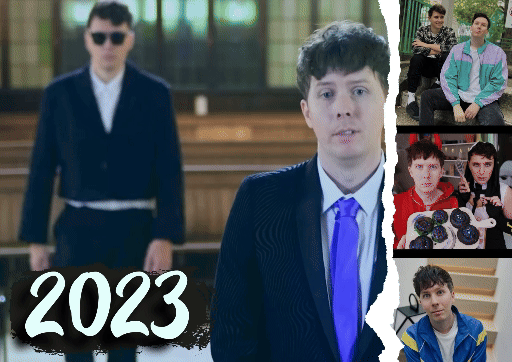

Countdown to October 19th (19/19)
Happy 15 Years of Dan and Phil 🩵🩵🩵
#woop it is done#19 gif/edits over the past 19 days#I just finished this with like 20 minutes to go#considering I have had this planned for months I sure left a lot to the last minute#I am glad I did it considering mere hours before the first one I was so close to deleting everything I had done#because my mind was just like nooopppee it's not going to be good and people will hate it#so I just scheduled my first couple of posts and just backed away from my computer before I could delete anything#and it was all fine and people were really nice about it#people have said a lot of nice things on many of these posts and I have really appreciated it#because I know at least one person liked my post which was a nice feeling#dan and phil#dnp#danandphil#phan#amazingphil#my gifs#dnp gifs#danandphilgames#dan and phil games#daniel howell#dpgphanniversary#phan countdown
734 notes
·
View notes
Text

SECOND character for the "give me 4 twst characters to make fan art of" art challenge. Our favorite hyena
Ruggie Bucchi! 🍩
#TWST#(SpongeBob narrator) one month lateaegr#Ruggie Bucchi#twisted wonderland#my art#art#twst ruggie#yeah just two more left lmao#disney twst
396 notes
·
View notes
Text
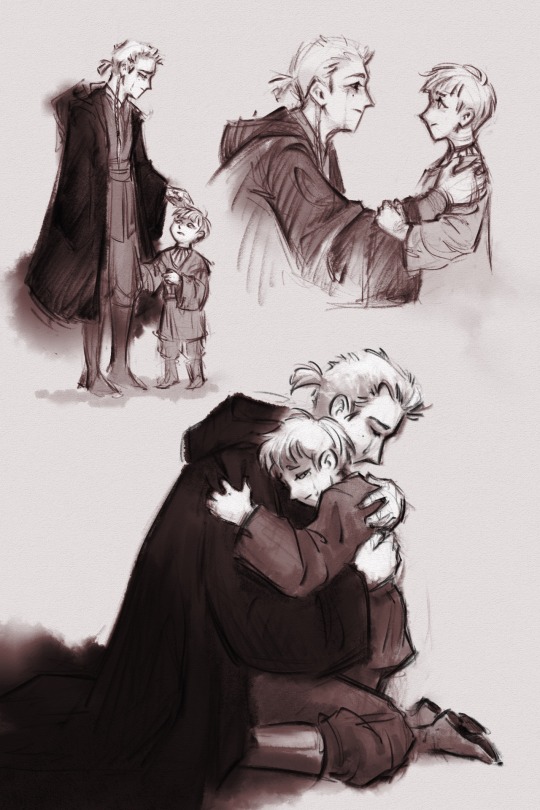
Lost boys
#mayhem art#star wars#anakin skywalker#obi wan kenobi#anakin skywalker fanart#obi wan kenobi fanart#star wars art#this one was sitting in my drafts for about a month. idk why I was holding onto it -cries- anyway#this is shortly after Qui-Gon's death. Both of their lives just got flipped upside down. Anakin is traumatized by having to leave#his mother behind‚ then his Master's sudden death‚ and he's left with no certainty in his future.#Obi-Wan just witnessed his Master die‚ helplessly‚ then having to take care of this little human in his Master's stead‚ meanwhile feeling#wholly inadequate to be so suddenly knighted let alone immediately becoming a Master and taking responsibility for another being.#Both of them losing the constants in their lives. left uprooted. the only anchoring point being each other.#I imagine Obi-Wan wouldn't reach out to Anakin first‚ but if Anakin expressed compassion with him‚ grief‚ and his need to feel secure‚#Obi-Wan wouldn't turn him away#this was just my excuse to give them a proper soothing hug in their time of mourning
2K notes
·
View notes
Text
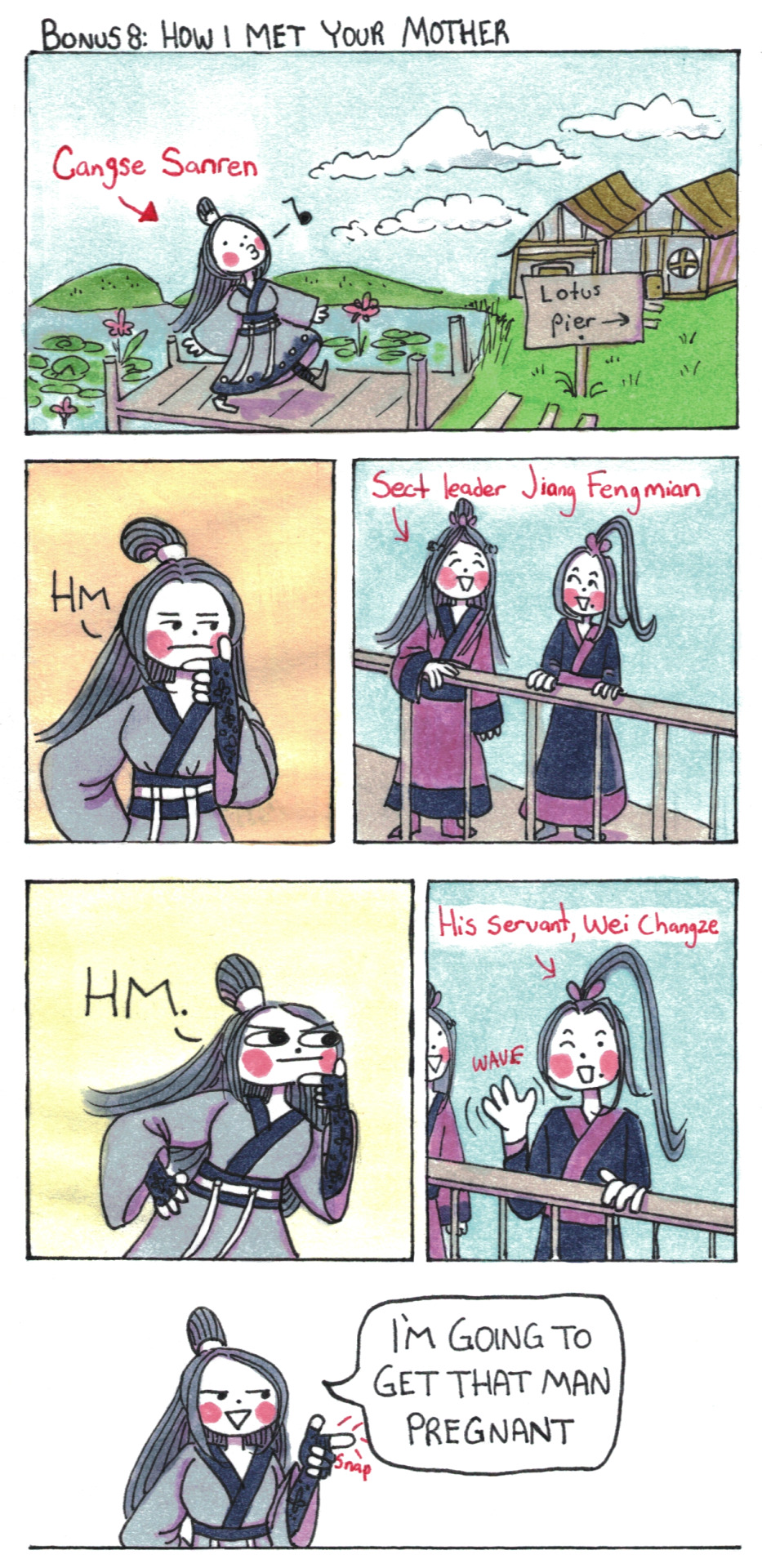
Bonus 8: How met your mother (CSSR design by @qourmet!)
[First] Prev <–-> Next
#poorly drawn mdzs#mdzs#cangse sanren#wei changze#jiang fengmian#It was important to me that WCZ had the hereditary mole. I will die on this hill.#I have been *waiting* for the day to finally arrive when I could finally make this comic. It's been marinating for months.#My mission is to redraw all of qour's character designs one day. They are just *that* good.#CSSR has the vibes of a wandering menace who shows up in towns like a stray cat arriving at a new doorstep for treats. 10/10.#While YZY strongly leads us to believe that JFM was in love with CSSR and that's his whole motivation behind taking wwx in-#-I do think this is (once again) rumour being presented as reality. It's the juicer story to tell after all.#It is still possible that he did love her! But I think that story undercuts the relationship he also had with WCZ.#Yall ever think about how JC and WWX parallel their fathers? How Wei Changze also left the Jiang Leader's side? I do.#Unlike JC though It is far more hilarious and plausible to imagine JFM begging to be CSSR and WCZ's third. You know he would.#My wild headcanon is that JFM and YZY are in a mlm and wlw arranged marriage situation. Deeply unhappy as partners. Better as friends.#they care for each other and I'll admit that there is a beautiful tragedy in them having romantic feelings for each other the whole time.#But I am also here for the gaffs. Let them be unfulfilled homosexuals together.#Meanwhile cssr and wcz are having incredible hetrosexual sex in a bisexual way that WILL leave him pregnant by the end of it.
3K notes
·
View notes
Text
Not a day goes by where I do not think about the advent of medicine like PrEP and wonder just what the people - especially queer people - who passed from HIV/AIDs during the AIDs crisis would think
And then, I read this survivor's testimony and it just makes me emotional. I think this is the closest answer we have. HIV has changed, and we must always remember the people who didn't see that change before it happened.

#gay#queer#lgbt#lgbtq#described images#image description in alt#i do try to learn from older queer people about this tome period because i wasn't around for it#but i always wondered what the people who didn't make it would have thought of where we are now#there's this weird grief and celebration because i am so glad we are where we are. i just wish everybody cpuld have seen this#this is why it's so important to learn from each other about everything#it takes a village to create community#i have been thinking about that twitter post at LEAST once a month since i first saw it#very complex feelings on this one folks#there is so much left to learn i think but this just hits me in a specific way
3K notes
·
View notes
Text

Sentient Amalgamation
#generation loss#generation loss fanart#ranboo fanart#ranbooart#ranboo#genloss#generation loss the social experiments#genloss fanart#genloss tse#traditional art#acrylic on canvas#acrylic painting#now..let me tell you about this pain of a piece#I absolutely adore the final product!#but that wasn’t before I spent the first few days on it back in October 2024#it was going great on the first few layers of paint#then I started to detail it more and it just lost its texture and looseness#and I hated it…so I abandoned it for over a month#then revisited it early December 2024 to gesso over two thirds of the canvas#(the only thing that was kept was the one person subject you see in the final piece)#and then left it sitting for another week while I figured out what I wanted to do with it#and finally#FINALLY#figured it out and MMMMWAH I love it!!!#and here’s my final painting and final piece of 2024#weathereraart
350 notes
·
View notes
Text
I love you fics that are people clearly just projecting their thoughts about being arospec onto a character.
#just blahs#shout out to the one aro jon fic that i bookmarked 3 years ago when i first realized I was aro that i reread every few months#just reread it again and left another comment on it#and aromantics this is your sign to go write that rambly aromantic projection fic because i promise you someone out there will love it#and someone will read that and see thoughts that theyve had and know that they arent the only one#and maybe someone will comment on that and you'll know that you arent alone either#i just really love messy rambling projection fics#theyre so important to me#aromantic#arospec#aspec#aro
199 notes
·
View notes
Text
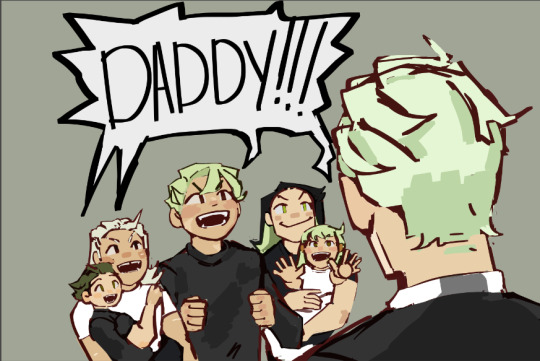

#one night as i was slowly falling asleep I thought of this drawing but I had missed a wonderful opportunity by replacing sebeks text#with the vine dADDY? DO I LOOK LIKE-#But now yknow that the thought was considered#my art#twisted wonderland#twisted wonderland fanart#twst art#twst#disney twst#twst artwork#twst sebek zigvolt#twst sebek#sebek zigvolt#i designed children#arnt they cute?#say theyre cute rn-#OKAY AND JUST IN CASE I SWEAR ITS NOT A SEBEK AND SILVER LOVE CHILD THING I CAN ALREADY SEE SOMEONE ASKING BECAUSE OF THE CHILD ON THE LEFT#BUT ITS NOT#twst fanart#*this has been in my drafts for 2 months kadmksdm
2K notes
·
View notes
Text
patience being tested. being forced by a bizarre unfortunate situation to adhere to university requirement technicality by taking this simple basic elementary "introduction to environmental history" class.
this class is from facilitators/program which do, like, "history of the American frontier" or "history of fishing and hunting" and still basically subscribe to that old-school twentieth-century idealization and celebration of characters like Teddy Roosevelt and reverence for a mythical arc-of-history-bent-towards-justice narrative of the often-clumsy but ultimately-benevolent US federal government and its mission to "save nature" through the miracle of "sustained yield," while heroic federal land management agencies and "heritage" institutions lead to way, staffed by exceptional individuals (appeals to nostalgia for the frontier and an imagined landscape of the American West; ego-stroking appeals to flattering self-image that center the environmentalist or academic). where they invoke, y'know, ideas like "ecology is important because don't you enjoy cross-country skiing in The Woods with your niece and nephew? don't you like hunting and fishing?" which makes it feel like a time capsule of appeals and discourses from the 1970s. and it invokes concept of "untouched wilderness" (while eliding scale of historical Indigenous environmental relationships and current ongoing colonial violence/extractivism). but just ever-so-slightly updated with a little bit of chic twenty-first-century flair like a superficial land acknowledgement or a reference to "labor histories" or "history from below," which is extra aggravating when the old ideologies/institutions are still in power but they're muddying the water and diluting the language/frameworks (it's been strange, watching words like "multispecies" and "Anthropocene" over the years slowly but surely show-up on the posters, fliers, course descriptions, by now even appearing adjacent to the agri-business and resource extraction feeder programs, like a recuperation or appropriation.) even from a humanities angle, it's still, they're talking at me like "You probably didn't know this, but environmental history is actually pretty entangled with political and social events. In fact, we can synthesize sources and glean environmental info from wacky places like workers' rolls in factories, ship's logs, and poetry from the era." and i'm nodding like YEP.
the first homework assignment is respond to this: "Define and describe 'the Anthropocene'. Do you think 'the Anthropocene' is a useful concept? Why or why not?" Respond in 300 words.
so for fun, right now in class, going to see how fast i can pull up discussion of Anthropocene-as-concept solely from my old posts on this microblogging site.
---
ok, found some
---
I think that the danger in any universal narrative or epoch or principle is exactly that it can itself become a colonizing force. [...] I’m suspicious of the Anthropocene as concept for the very reason that it subsumes so many peoples, nations, histories, geographies, political orders. For that reason, I think ideas like the Anthropocene can be a useful short-hand for a cluster of tangible things going on with the Earth at the moment, but we have to be very careful about how fluid and dynamic ideas become concretized into hegemonic principles in the hands of researchers, policymakers, and politicians. There’s so much diversity in histories and experiences and environmental realities even between relatively linked geographies here in Canada [...]. Imagine what happens when we try to do that on a global scale - and a lot of euro-western Anthropocene, climate change and resilience research risks doing that - eliding local specificities and appropriating knowledge to serve a broader euro-western narrative without attending to the inherent colonial and imperial realities of science and policy processes, or even attending to the ways that colonial capitalist expansion has created these environmental crises to begin with. While we, as a collective humanity, are struggling with the realities of the Anthropocene, it is dangerous to erase the specific histories, power-relations, political orders that created the crisis to begin with. So, I’m glad that a robust critique of the Anthropocene as a concept is emerging.
Text by: Words of Zoe Todd, as interviewed and transcribed by Caroline Picard. “The Future is Elastic (But it Depends): An Interview with Zoe Todd.” 23 August 2016.
---
---
---
The Great Acceleration is the latest in a series of human-driven planetary changes that constitute what a rising chorus of scientists, social scientists, and humanists have labeled the Anthropocene - a new Age of Humans. [...] But what the Anthropocene label masks, and what the litany of graphs documenting the Great Acceleration hide, is a history of racial oppression and violence, along with wealth inequality, that has built and sustained engines of economic growth and consumption over the last four centuries. [...] The plantation, Sidney Mintz long ago observed, was a “synthesis of field and factory,” an agro-industrial system of enterprise [...]. Plantation legacies, along with accompanying strategies of survival and resistance, dwell in the racialized geographies of the United States’ and Brazil’s prison systems. They surface in the inequitable toxic burdens experienced by impoverished communities of color in places like Cancer Alley, an industrial corridor of petrochemical plants running along the Mississippi River from New Orleans to Baton Rouge, where cotton was once king. And they appear in patterns of foreign direct investment and debt servitude that structure many land deals in the Caribbean, Brazil, and sub-Saharan Africa [...]. [C]limatologists and global change scientists from the University of London, propose instead 1610 as a date for the golden spike of the Anthropocene. The date marked a detectable global dip in carbon dioxide concentrations, precipitated, they argue, by the death of nearly 50 million indigenous human inhabitants [...]. The degradation of soils in the tobacco and cotton-growing regions in the American South, or in the sugarcane growing fields of many Caribbean islands, for example, was a consequence of an economic and social system that inflicted violence upon the land and the people enslaved to work it. Such violent histories are not so readily evident in genealogies that date the Anthropocene’s emergence to the Neolithic Revolution 12,000 years ago, the onset of Europe’s industrial revolution circa 1800, or the Trinity nuclear test of 1945. Sugarcane plantations were already prevalent throughout the Mediterranean basin during the late middle ages. But it was during the early modern era, and specifically in the Caribbean, where the intersection of emerging proto-capitalist economic models based on migratory forced labor (first indentured servitude, and later slavery), intensive land usage, globalized commerce, and colonial regimes sustained on the basis of relentless racialized violence, gave rise to the transformative models of plantations that reshaped the lives and livelihoods of human and non-human beings on a planetary scale. [...] We might, following the lead of science studies scholar Donna Haraway and anthropologist Anna Tsing, more aptly designate this era the Plantationocene. [...] It is also an invitation to see, in the words of geographer Laura Pulido, “the Anthropocene as a racial process,” one that has and will continue to produce “racially uneven vulnerability and death." [...] And how have such material transformations sustained global flows of knowledge and capital that continue to reproduce the plantation in enduring ways?
Text by: Sophie Sapp Moore, Monique Allewaert, Pablo F. Gomez, and Gregg Mitman. "Plantation Legacies." Edge Effects. 22 January 2019. Updated 15 May 2021. [Bold emphasis added by me.]
---
---
---
Geologists and other scientists will fight over [the definition of the beginning start-date of the Anthropocene] in scientific language, seeking traces of carbon dioxide that index the worst offenses of European empire which rent and violated the flesh, bodies, and governance structures of Indigenous and other sovereign peoples in the name of gold, lumber, trade, land, and power. [...] The stories we tell about the origins of the Anthropocene implicate how we understand the relations we have with our surrounds. In other words, the naming of the Anthropocene epoch and its start date have implications not just for how we understand the world, but this understanding will have material consequences, consequences that affect body and land.
Text by: Heather Davis and Zoe Todd. On the Importance of a Date, or Decolonizing the Anthropocene. ACME An International Journal for Critical Geographies. December 2017. [Bold emphasis added by me.]
---
---
---
From Aime and Suzanne Cesaire, C. L. R. James, Claudia Jones, Eduoard Glissant, through Sylvia Wynter, Christina Sharpe, and so many others, critical anticolonial and race theory has been written from the specific histories that marked the Black Atlantic. [...] Glissant also reminds us, secondly, of how cunning the absorptive powers of [...] liberal capitalism are - how quickly specific relations are remade as relations-erasing universal abstractions. [...] This absorptive, relations-erasing universalism is especially apparent in some contemporary discourses of […] liberalism and climate collapse - what some call the Anthropocene - especially those that anchor the crisis in a general Human calamity which, as Sylvia Wynter has noted, is merely the name of an overdetermined and specific [White] European man. […] [T]he condition of creating this new common European world was the destruction of a multitude of existing black and brown worlds. The tsunami of colonialism was not seen as affecting humanity, but [...] these specific people. They were specific - what happened to them may have been necessary, regrettable, intentional, accidental - but it is always them. It is only when these ancestral histories became present for some, for those who had long benefitted from the dispossession [...], that suddenly the problem is all of us, as human catastrophe.
Text by: Elizabeth Povinelli. “The Ancestral Present of Oceanic Illusions: Connected and Differentiated in Late Toxic Liberalism.” e-flux Journal Issue #112. October 2020.
---
The narrative arc [of White "liberal humanism"] [...] is often told as a kind of European coming-of-age story. […] The Anthropocene discourse follows the same coming-of-age [...] script, searching for a material origin story that would explain the newly identified trajectory of the Anthropos […]. Sylvia Wynter, W.E.B. DuBois, and Achille Mbembe all showed how that genealogy of [White subjecthood] was [...] articulated through sixteenth- through nineteenth-century [historiographies and discourses] in the context of colonialism, [...] as well as forming the material praxis of their rearrangement (through mining, ecological rearrangements and extractions, and forms of geologic displacements such as plantations, dams, fertilizers, crops, and introduction of “alien” animals). […] As Wynter (2000) commented, “The degradation of concrete humans, that was/is the price of empire, of the kind of [Eurocentric epistemology] that underlies it” (154).
Text by: Kathryn Yusoff. “The Inhumanities.” Annals of the American Association of Geographers, Volume 11, Issue 3. November 2020.
---
---
---
As Yarimar Bonilla suggests in regard to post-Irma-and-Maria Puerto Rico, “vulnerability is not simply a product of natural conditions; it is a political state and a colonial condition.” Many in the Caribbean therefore speak about the coloniality of disaster, and the unnaturalness of these “natural” disasters [...]. Others describe this temporality by shifting [...] toward an idea of the Plantationocene [...]. As Moore and her colleagues write, “Plantation worlds, both past and present, offer a powerful reminder that environmental problems cannot be decoupled from histories of colonialism, capitalism, and racism that have made some human beings more vulnerable [...].” [W]e see that contemporary uneven socioecologies associated with the rise of the industrial world ["the Anthropocene"] are based [...] also on the racialized denial and foreshortening of life for the sacrificial majority of black, brown, and Indigenous people and their relegation to the “sacrifice zones” of extractive industry. [...] [A]ny appropriate response to the contemporary climate emergency must first appreciate its foundations in the past history of the violent, coercive, transatlantic system of plantation slavery; in the present global uneven development, antiblackness, and border regimes that shape human vulnerability [...] that continues to influence who has access to resources, safety, and preferable ecologies [...] and who will be relegated to the “plantation archipelagoes” (as Sylvia Wynter called them) [...].
Text by: Mimi Sheller. “Thinking Beyond Coloniality: Toward Radical Caribbean Futures.” Small Axe (2021), 25 (2 (65)), pages 169-170. Published 1 July 2021. [Bold emphasis added by me.]
---
---
---
Indigenous genocide and removal from land and enslavement are prerequisites for power becoming operationalized in premodernity [...]; it was/is a means to operationalize extraction (therefore race should be considered as foundational rather than as periphery to the production of those structures and of global space). [...] Wynter suggests that we […] consider 1452 as the beginning of the New World, as African slaves are put to work on the first plantations on the Portuguese island of Madeira, initiating the “sugar-slave” complex - a massive replantation of ecologies and forced relocation of people […]. Wynter argues that the invention of the figure of Man in 1492 as the Portuguese [and Spanish] travel to the Americas instigates at the same time “a refiguring of humanness” in the idea of race. [...] The natal moment of the 1800 Industrial Revolution, […] [apparently] locates Anthropocene origination in […] the "new" metabolisms of technology and matter enabled by the combination of fossil fuels, new engines, and the world as market. […] The racialization of epistemologies of life and nonlife is important to note here […]. While [this industrialization in the nineteenth century] […] undoubtedly transformed the atmosphere with […] coal, the creation of another kind of weather had already established its salient forms in the mine and on the plantation. Paying attention to the prehistory of capital and its bodily labor, both within coal cultures and on plantations that literally put “sugar in the bowl” (as Nina Simone sings) […]. The new modes of material accumulation and production in the Industrial Revolution are relational to and dependent on their preproductive forms in slavery […]. In 1833, Parliament finally abolished slavery in the British Caribbean, and the taxpayer payout of £20 million in “compensation” [paid by the government to slave owners for their lost "property"] built the material, geophysical (railways, mines, factories), and imperial infrastructures of Britain and its colonial enterprises and empire. [...] A significant proportion of funds were invested in the railway system connecting London and Birmingham (home of cotton production and […] manufacturing for plantations), Cambridge and Oxford, and Wales and the Midlands (for coal). Insurance companies flourished [...]. The slave-sugar-coal nexus both substantially enriched Britain and made it possible for it to transition into a colonial industrialized power […]. The slave trade […] fashioned the economic conditions (and institutions, such as the insurance and finance industries) for industrialization.
Text by: Kathryn Yusoff. "White Utopia/Black Inferno: Life on a Geologic Spike". e-flux Journal Issue #97. February 2019. [Bold emphasis added by me.]
#sorry for being mean#instructor makes podcasts about cowboys HELP ME#and he recently won a New Business award for his startup magazine covering Democrat party politics in local area HELP#so hes constantly performing this like dance between new hip beerfest winebar coolness and oldfashioned masculinity#but hes in charge of the certificate program so i have to just shut up and keep my head down for approximately one year#his email address is almost identical to mine and invokes enviro history terms but i made mine long before when i was ten years old#so i could log in to fieldherpforum dot com to talk about enviro history of distribution range changes in local reptiles and amphibians#sir if you read my blog then i apologize ive had a long year#and i cant do anything to escape i am disabled i am constantly sick im working fulltime i have NO family i have NO resources#i took all of this schools graduate level enviro history courses and seminars years ago and ran the geography and enviro hist club#but then left in final semester because sudden hospitalization and crippled and disabled which led to homelessness#which means that as far as any profession or school is concerned im nobody im a retail employee#i was doing conference paper revisions while sleeping on concrete vomiting walking around on my cane to find outdoor wifi#and im not kidding the MONTH i got back into a house and was like ok going back to finish the semester the school had#put my whole degree program and department in moratorium from lack of funding#and so required starting some stuff from scratch and now feel like a hostage with debt or worsening health that could pounce any moment#to even get back in current program i was working sixteen hours a day to pay old library fines and had to delicately back out of workplace#where manager was straight up violently physically abusive to her vulnerable employees and threatened retaliation#like an emotional torturer the likes of which i thought existed only in cartoons#and the week i filed for student aid a massive storm had knocked out electricity for days and i was clearing fallen tree debris#and then sitting in the dark in my room between job shifts no music no phone no food with my fingers crossed and i consider it a miracle#sorry dont mean to dramatize or draw attention to myself#so actually im happy you and i are alive
134 notes
·
View notes
Text
You know, i've been thinking about the way Batman keeps danger and weapons so close to his body, so tight to himself, practically tied around his neck, that joker often has no way left but to grab for him if he wants something Batman has. Batman does not want to be left out of Joker's plans, his story, he wants in on Joker's narrative by any means he can make it happen. It's such particular "you take me with you wherever you are, it's your punishment, just as it's my punishment to take you with me wherever i am" statement. Batman actively leaves no choice for Joker but to get very very close to him and claim him as part of his win or his loss. I mean,
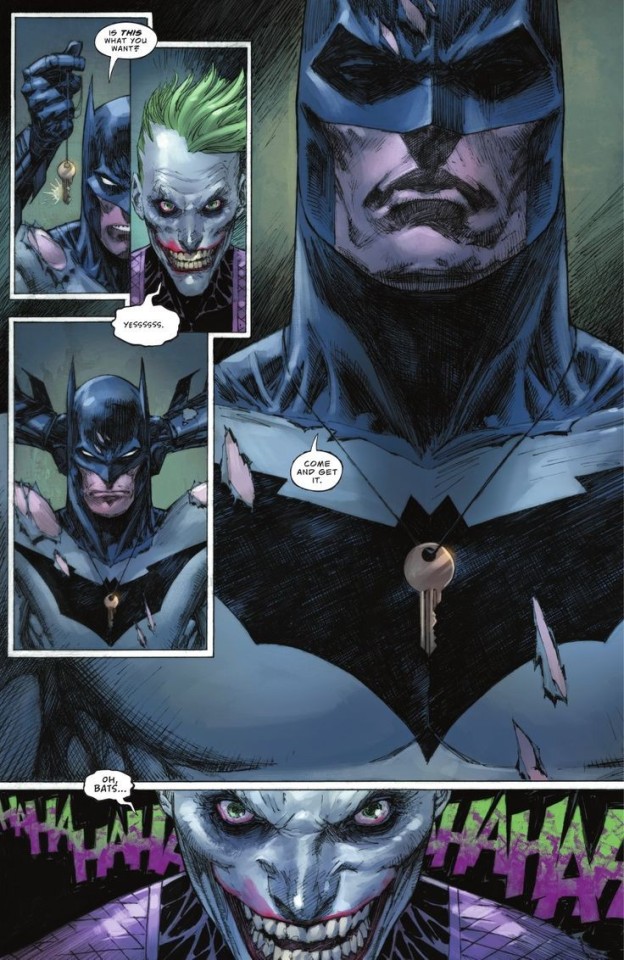
he didn't have to. he could've put the key in one of his waist pouches, push it into the back of his left boot, he could've tied it around his bicep, i dont care— he could've done whateverthefuck with it. But he had to put it around his neck, and intentionally invite Joker to "come and get it". Something something classic cliche of the way lovers' bond is signified by a necklace-adjacent item and the way they interact with it; hold unto it, toss it, tie it around their necks, giving it back, not giving it back, necklaces as items of reverance and revenge. Something something a tie around neck being a sign of being claimed and owned,
#this is the first night in 2 months where i got good sleep of course i woke up and had batjokes popping on my brain screen#''99+ unread emails'' style#the whole invitation thing is. certainly something#i mean bro. a ''you will take that wish to the grave with you'' would do just fine or#or ''you will not have it.''#Bruce wants his fights alright. He's uneasy with being left out of things often but he's particularly uneasy#with being left out of Joker's narrative#and it's far less about him ''being the only one strong enough to deal with him'' than he'd like to admit#batjokes#batjokes meta#Batman#Batman meta
561 notes
·
View notes